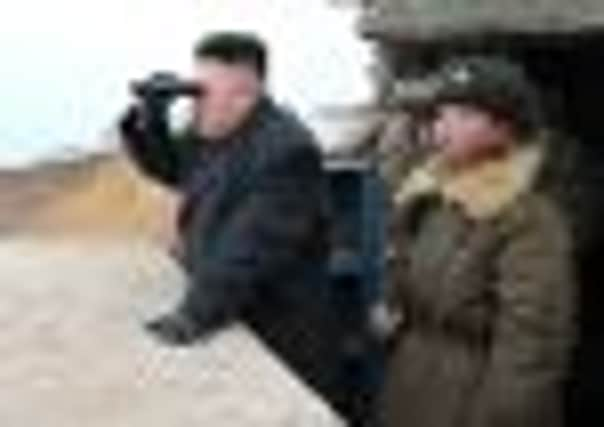Kim ’s temper tantrum needs the Talleyrand touch


Whether or not this Marxist La La Land possesses sophisticated heat-seeking missiles is a moot point; it certainly has an attention-seeking leader. The compulsive need of Kim Jong-un to feature centre-stage by issuing bloodcurdling, if implausible, threats resembles a phenomenon that many mothers of toddlers would recognise. North Korea is one geopolitical crisis where the solution might not be to send for Dr Kissinger but for Dr Spock.
America’s mistake has been to respond in kind to Kim’s bluster. That is a cultural problem: Yanks do not do dignified silence. Under the Obama administration they do not do dignified anything. By the end of last week it was beginning to dawn on some US officials that they had mishandled the situation, not only verbally but by ostentatiously deploying nuclear-capable B-2 Spirit stealth bombers and F-22 Raptor stealth jet fighters in military exercises over South Korea. On Thursday, while the State Department was still defending its hawkish stance, the Department of Defense was having second thoughts. An official there said: “We accused the North Koreans of amping things up – now we are worried we did the same.” He claimed the department was now “trying to turn the volume down… ratchet back the rhetoric”.
Advertisement
Hide AdAdvertisement
Hide AdThat insight came rather late but it was nonetheless correct. The pretext for reciprocal sabre-rattling is that America’s allies must be reassured; but the South Korean government and public know very well the strength of the United States’ self-interested commitment to defending their territory without the Pentagon needing to darken their skies with military hardware. The reason why the Americans should have talked soft, or not talked at all, has nothing to do with placating the murderous genocides in Pyongyang. On the contrary, Marxism must invariably be confronted and, where possible, destroyed at every opportunity. In this instance, however, the weight of the response was counter-productive since it enhanced the regime’s sense of its own geopolitical importance and enabled it to manipulate a superpower.
You could not ask for a better illustration of the realities of Marxism, as distinct from the sanitised caricature presented in British academic circles, than the North Korean regime. Its founder, the Great Leader, Kim Il-sung, who also invented physics, the automobile, the electric toaster and the internet, besides walking on the Moon, may seem a deluded charlatan to those of us in the sophisticated West who know that most of those achievements were actually accomplished by Tony Blair and Al Gore; but the myth of the Kim dynasty holds powerful sway over its helots. Kim Jong-un, the Great Leader’s youngest grandson, was preferred to his elder brothers because one was arrested while travelling on a false passport in an attempt to visit Disneyland in Tokyo (he would almost certainly have found the transition from Pyongyang to Disneyland anticlimactic) and the second brother was pronounced too “girlish” to succeed.
With 2 million North Koreans killed by famine caused by Marxist agricultural policies and another 1.5 million slaughtered in concentration camps, the regime exemplifies the celebrated maxim of leftist apologists that you cannot make an omelette without breaking eggs. The egg that might conceivably be broken in this current confrontation, if the regime risks losing face or a provocation accidentally gets out of hand, is South Korea. The North can field 5.8 million troops and has the largest arsenal of chemical and biological weaponry in the world. The capabilities of its missiles are almost academic. More alarming is the level of delusion prevailing in Western capitals. The latest on dit is that China has tired of its fractious neighbour and will soon “rein in” North Korea.
That is a dangerous misperception. China cannot rein in North Korea because the rogue state is not amenable to Beijing’s bidding and the loss of face if its traditional patron suffered a rebuff would be fatal to China’s regional ambitions. Beijing is chronically mistrustful that any resolution of the Korean problem would create a unified peninsula under American influence, buttressed by Japan. On the other hand, a nuclear-armed North Korea would present a different kind of threat to America from the rain of missiles that Pyongyang has been conjuring in recent fantasies. It would threaten the much-vaunted American “pivot” in south-east Asia by provoking South Korea and Japan to seek nuclear weapons too – gaining a degree of independence and fuelling Chinese paranoia.
This is a nasty can of worms. There is more happening here than a naughty boy with an appalling haircut throwing a temper tantrum. It is a situation demanding the Talleyrand touch; unhappily for the world, what it is getting is the Obama touch. Be very afraid. «
Twitter: @GeraldWarner1